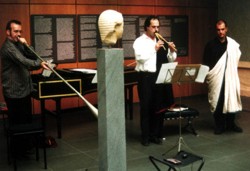"Melpomen" - Ancient Greek Music
Music for a 5th-century BC symposion, reconstructed and newly created by: Conrad Steinmann on aulos, with Luiz Alvez da Silva (song, alto) and Massimo Cialfi (tympanon, kymbala, salpinx).
The dances, nomoi and monodies by classical Greek lyricists (Bacchylides, Simonides, Pindar, Terpander).
A question may arise why we should want to perform such ancient music today. And is the whole thing not pure speculation anyway?
What is the abiding attraction of such an enterprise? Where is the most appropriate key to the sounds, melodies and rhythms to be found? Where can the project which unites musical archeology and practice coupled with historical imagination take us in the end?
It is possible to gather an astonishing amount of material about the outward musical side of a 5th-century symposion. From various sources we can learn what people
To be charmed and inspired by some historical epochs or by one's own past, is an extravagance indulged in for various reasons. Interestingly, in recent years the influence of ancient Greece can be traced in various fields of art and science.
For years now I've also been involved, together with the instrument-maker Paul J. Reichlin, with the "material" side of things - wood, the measurements of instruments and the logic of their construction. Proceeding from the assumption that every instrument has perfectly corresponded with the needs of the musicians and the music of their period, and consequently every detail, even the smallest, must have a technical and musical function, we have let ourselves be guided by our concrete material. We adhere to the principle that every step must logically follow from what has gone before. This applies both to handicraft side of our job and to posing questions generally. For instance, the outsider's first question usually is what sequences of sound and intervals were actually produced by the aulos. This is obviously also my own first consideration when I start to play the instrument. But it is even more important to us that what I do follows logically from our research earlier. The music as I envision it, and what follows, is based above all on the possibilities offered by the instrument. The same applies to playing techniques.
On the one hand we are guided by the sounds, tones and melodies produced by the few surviving 5th-century auloi, but also by innumerable, and to our mind, very explicit vase paintings. On the other hand, Classical Greek tells as much about its own rhythmics, and, through word stress, about the melody of speech. Thus, our guide and inspiration for this Symposion-programme has been the poetry and songs of Simonides, Bacchylides, Terpandros and Aeschylus. My experience with the music of Aeschylus's drama Prometheus has given me an idea of what the treatment of tempo and time might have been like.
Time, tempo, rhythm, and the poetry itself, lead us naturally to instrumental pieces, the nomoi and dances. A number of percussion instruments, like the tympanon, kymbala or krotala, in their own way support the rhythmical pattern, or mode. The playing poses on the vases coupled with surviving playing techniques from regions of former Hellas (like South Italy) yield convincing results. Mediterranean singing techniques which have survived relatively unchanged for centuries, when supplemented with information gained about singing poses from the vases, and the specific sound of the aulos, revive monodies which have long kept their silence.



